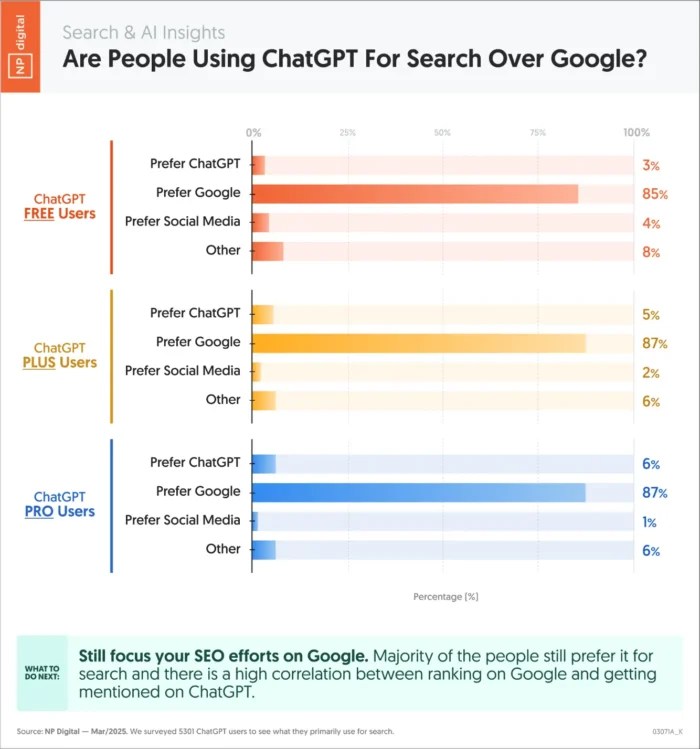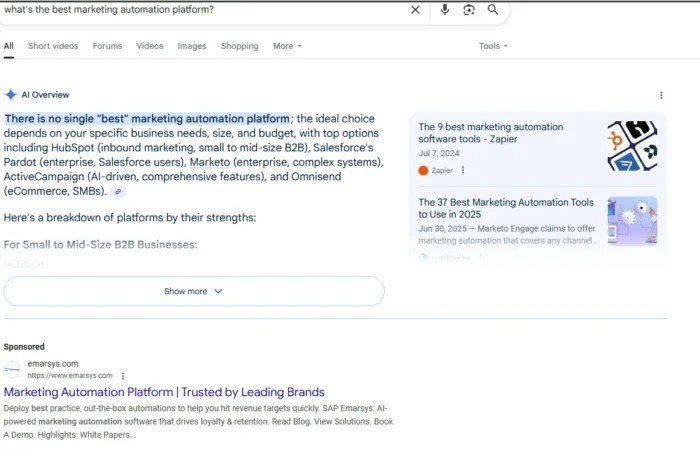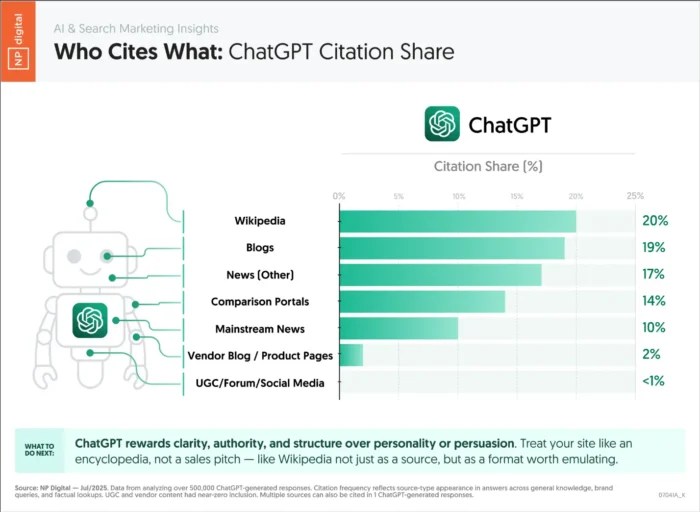ChatGPT Advertising: A New Channel for Marketers?
OpenAI just dropped a hint that could reshape digital advertising forever. They’re exploring ads on ChatGPT.
Right now, ChatGPT doesn’t run ads. But OpenAI’s CFO recently confirmed they’re considering advertising for non-paying users as a way to monetize their massive free user base. With over 800 million weekly users asking high-intent questions regularly, this could become one of the biggest new ad opportunities since Facebook launched business pages.
Here’s what matters: ChatGPT users aren’t passively scrolling. They’re actively seeking solutions. What does this mean for marketers?
It opens up a potentially powerful new channel to reach highly engaged users who are already in problem-solving mode. And just like search or social ads, it could become a staple in your paid strategy.
Let’s break down what we know, what we can guess, and how to get ready.
Key Takeaways
- OpenAI is exploring ChatGPT ad options to monetize free users, potentially creating a massive new advertising platform.
- ChatGPT advertising will likely integrate directly into conversations, making ads feel more natural than traditional display formats.
- Early ad formats may include sponsored responses, product recommendations within answers, and context-driven placements.
- Businesses should start preparing now by optimizing for AI visibility through better content, stronger authority signals, and structured data.
- Even without paid options, brands can already improve their chances of being mentioned in ChatGPT responses through smart SEO strategies.
What Do We Know About ChatGPT Ads So Far?
The short answer? Not much, but enough to get excited.
Sam Altman previously called ads a “last resort,” but that was before ChatGPT’s infrastructure costs skyrocketed. Running AI at this scale isn’t cheap.
The financial reality is pushing them toward advertising. And honestly, it makes sense.
ChatGPT’s user behavior is perfect for ads. People ask specific questions like “What’s the best project management software for remote teams?” or “How do I fix a leaky faucet?” This is what we would consider a high-intent query.

Compare that to social media, where users may be scrolling mindlessly through content. ChatGPT users come with problems they need solved. That’s advertiser gold.
Recent reports suggest OpenAI is testing different monetization approaches, including partnerships with publishers and potential sponsored content integrations. While they haven’t confirmed an advertising timeline, the infrastructure for targeting and personalization already exists within their platform.
The user base numbers tell the story. ChatGPT reached 100 million users faster than any consumer app in history, and that number has only grown since then. That’s a lot of advertising inventory waiting to be unlocked.

What Might ChatGPT Ads Look Like?
Nobody knows for sure, but we can make educated guesses based on other AI platforms and ChatGPT’s interface.
Sponsored Responses: Think Google Ads, but conversational. Instead of clicking a blue link, users might see a sponsored answer at the top of ChatGPT’s response, clearly marked as an ad. For example, someone asking “best CRM for small business” might see a Salesforce-sponsored response before the organic recommendations.
Native Product Mentions: This could be subtle. ChatGPT might naturally weave brand mentions into its answers, similar to how it currently references tools and services. The difference would be that some of these mentions are paid placements.
Contextual Recommendations: The AI could suggest specific products or services based on the conversation context. Ask about marketing automation, and you might see HubSpot mentioned alongside technical advice. We can see how this might play out in Google right now, where AI overviews and paid ads sit alongside each other.

Targeting Capabilities: ChatGPT already personalizes responses based on conversation history. Ads could use similar signals:
- Query intent (what the user is asking about)
- Conversation context (previous questions in the thread)
- User behavior patterns (topics they frequently discuss)
- Industry focus (B2B vs. consumer queries)
Pricing Models: Expect familiar models with AI twists:
- Cost-per-click (CPC): Pay when users click on your sponsored links
- Cost-per-engagement (CPE): Pay when users interact with your ad content
- Subscription packages: Monthly fees for guaranteed mention opportunities
- Performance-based pricing: Pay based on leads or conversions generated
The auction system will probably reward relevance over pure bid amounts, similar to Google’s Quality Score. ChatGPT won’t want to serve irrelevant ads that hurt user experience.
What ChatGPT Ads Mean For The Paid Media Landscape?
This isn’t just another ad platform. It could fundamentally change how advertising works. Let’s talk about why.
The Intent Advantage: ChatGPT captures intent differently than search engines by describing problems and solutions in natural language. That gives advertisers richer context about what people actually need.
Instead of bidding on “CRM software,” you might target conversations about “managing customer data across remote teams.” More specific, higher intent, better results.
Budget Reallocation: Smart marketers will test ChatGPT ads by shifting budget from other channels. Google Ads might lose some search volume as users turn to AI engines for answers. Social media budgets could move toward conversational platforms.
Screenshot suggestion: Pull up any major digital advertising spending report from eMarketer or Statista showing platform distribution. This visualizes how ChatGPT could disrupt current ad spend allocation.
Competitive Response Google won’t sit still. They’re already testing ads in their AI Overview results. Microsoft will push Copilot advertising harder. Meta might accelerate their AI assistant features. ChatGPT’s success will force every major platform to evolve their ad offerings.
The biggest impact might be on content marketing. If ChatGPT starts citing fewer sources in favor of sponsored answers, organic content creators will need new strategies to maintain visibility.

Are ChatGPT Ads The Right Fit For Your Business?
The opportunity is exciting, but it’s not universal. Businesses should weigh their target audience, funnel stage, and goals.
Who might benefit most:
- SaaS: Those solving niche problems where buyers ask “what’s the best tool?”
- E-commerce: High-consideration products like electronics, fitness equipment, or B2B supplies.
- Education: Online courses and certifications.
- Professional services: Law, finance, healthcare, and marketing.
Who might not:
- Brands selling impulse-buy, low-cost items.
- Niche industries with limited digital demand.
User Demographics and Behavior: ChatGPT’s user base tends to skew younger and more tech-savvy than average. If your customers are primarily older or less digitally engaged, this platform might not deliver strong ROI initially.
Budget Considerations: Early adopters often pay premium prices on new platforms. Plan to test with smaller budgets initially while the auction dynamics stabilize. Think of it like Facebook ads in 2008—high potential, but expect to learn through experimentation.
How You Can Prep For Ads on ChatGPT
Smart marketers start preparing before the platform launches ads. Here’s your playbook:
Map Customer Questions: Use tools like AnswerThePublic, Google’s “People Also Ask” feature, and your customer support logs to identify common questions your audience asks that could end up being entered into ChatGPT.

Develop Conversational Ad Copy: Start writing ads that sound natural in conversation. Instead of “Buy Our CRM Today!” try “For remote teams managing customer data, many companies choose [Your CRM] because it integrates with existing workflows.”
Audit Your Brand Authority: ChatGPT pulls information from authoritative sources. Strengthen your presence on:
- Industry publications and news sites
- High-authority directories and review platforms
- Academic or research publications in your field
- Influential podcasts and media mentions
Test Conversational Marketing Now: Experiment with chatbot marketing on your website or social media. This gives you practice with AI-style interactions before ChatGPT ads launch.
Prepare Attribution Models: Conversational ads might not follow traditional customer journey tracking. Users might mention your brand to colleagues or search for you later without clicking directly through ChatGPT. Plan for longer attribution windows and multiple touchpoint tracking.
Build Your Knowledge Base: Create comprehensive FAQ sections, detailed product documentation, and thorough how-to guides. The more authoritative content you publish, the more likely ChatGPT will reference your expertise.
Getting Your Business Featured on ChatGPT Without Ads
You don’t need to wait for paid options. Brands already appear in ChatGPT responses organically.
Strengthen Your Content Authority: Focus on E-E-A-T signals (Experience, Expertise, Authoritativeness, Trustworthiness). Publish detailed guides, case studies, and research that demonstrates deep knowledge in your field.
Optimize for Conversational Queries: Write content that answers questions the way people actually ask them. Instead of targeting “email marketing best practices,” create content around “how to write emails that people actually open.”
Build Relevant Brand Mentions: ChatGPT values brand mentions and links from trusted sources. Earn coverage from industry publications, news sites, and authoritative blogs in your space.

Use Structured Data: Implement schema markup on your website to help AI systems understand your content structure. FAQ schema, product schema, and organization schema can all improve your chances of being referenced.
Monitor Your Brand Mentions: Set up Google Alerts for your brand name and key executives. This gives you baseline data for how your brand is being discussed.
FAQs
Does ChatGPT have ads?
No, ChatGPT doesn’t currently run ads. OpenAI has acknowledged they’re exploring advertising as a revenue option, but no timeline has been announced. The platform remains ad-free for now.
Are ChatGPT recommendations sponsored?
Not yet. ChatGPT’s current recommendations come from its training data and real-time web access. No paid placements exist in the system today, though that may change as advertising features develop.
How can I get my business mentioned in ChatGPT?
Focus on building content authority through strong SEO, earning backlinks from reputable sources, and creating comprehensive content that answers user questions. While you can’t directly control it, ChatGPT is more likely to reflect information from well-established, authoritative sources.
Will ChatGPT ads work like Google Ads?
We don’t know the exact mechanics yet, but expect similarities in auction-based bidding and CPC pricing. The key difference will be conversational ad formats instead of traditional search result listings.
Should I shift budget from Google Ads to ChatGPT?
Not immediately. Wait for the platform to launch advertising features and establish performance benchmarks. When it does launch, test with small budget allocations before making major shifts from proven channels.
Conclusion
ChatGPT advertising isn’t live yet, but the foundation is being laid. Smart marketers are already preparing for what could become a massive new customer acquisition channel.
The opportunity is significant because ChatGPT users exhibit high-intent behavior in a conversational environment. That’s different from any existing ad platform and potentially more valuable than traditional search or social advertising.
Start building your authority now through better content, stronger industry connections, and optimized ChatGPT visibility. These investments will pay off whether you eventually run paid ads or simply want to improve your organic mentions.
Need help preparing your brand for AI-driven marketing? NP Digital specializes in emerging channel strategy and can help you build authority across all AI platforms.
Read more at Read More








Leave a Reply
Want to join the discussion?Feel free to contribute!